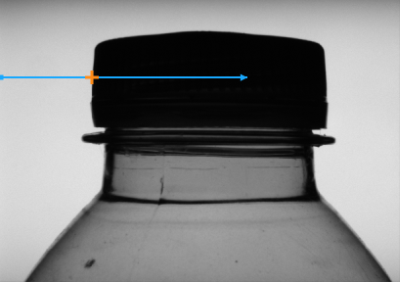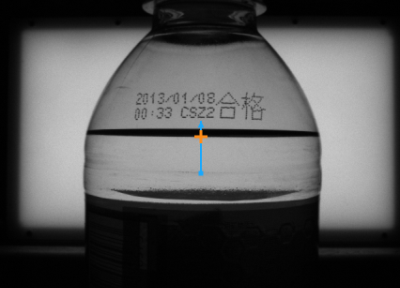You are here: Start » Function Reference » Computer Vision » 1D Edge Detection » ScanSingleEdge_Direct
ScanSingleEdge_Direct
| Header: | FIL.h |
|---|---|
| Namespace: | fil |
| Module: | MetrologyBasic |
Locates the strongest transition between dark and bright pixels along a given path (without a scan map).
Applications: Very fast detection of an object (e.g. horizontal displacement of a bottle) and simple measurements (e.g. liquid level in a bottle).
Syntax
void fil::ScanSingleEdge_Direct ( const fil::Image& inImage, const fil::Path& inScanPath, ftl::Optional<const fil::CoordinateSystem2D&> inScanPathAlignment, int inScanWidth, const fil::SamplingParams& inSamplingParams, const fil::EdgeScanParams& inEdgeScanParams, fil::Selection::Type inEdgeSelection, ftl::Optional<const fil::LocalBlindness&> inLocalBlindness, ftl::Conditional<fil::Edge1D>& outEdge, ftl::Optional<fil::Path&> outAlignedScanPath = ftl::NIL, ftl::Optional<fil::Profile&> outBrightnessProfile = ftl::NIL, ftl::Optional<fil::Profile&> outResponseProfile = ftl::NIL, ftl::Array<fil::Path>& diagSamplingPoints, float& diagSamplingStep )
Parameters
| Name | Type | Range | Default | Description | |
|---|---|---|---|---|---|
 |
inImage | const Image& | Input image | ||
 |
inScanPath | const Path& | Path along which the scan is performed | ||
 |
inScanPathAlignment | Optional<const CoordinateSystem2D&> | NIL | Adjusts the scan path to the position of the inspected object | |
 |
inScanWidth | int | 1 -  |
5 | Width of the scan field in pixels |
 |
inSamplingParams | const SamplingParams& | SamplingParams ( Interpolation: Bilinear SamplingStep: 1.0f SampleCount: Nil ) | Parameters controlling the sampling process | |
 |
inEdgeScanParams | const EdgeScanParams& | EdgeScanParams ( ProfileInterpolation: Quadratic4 SmoothingStdDev: 0.6f MinMagnitude: 5.0f EdgeTransition: BrightToDark ) | Parameters controlling the edge extraction process | |
 |
inEdgeSelection | Selection::Type | Selection mode of the resulting edge | ||
 |
inLocalBlindness | Optional<const LocalBlindness&> | NIL | Defines conditions in which weaker edges can be detected in the vicinity of stronger edges | |
 |
outEdge | Conditional<Edge1D>& | Found edge | ||
 |
outAlignedScanPath | Optional<Path&> | NIL | Transformed input path | |
 |
outBrightnessProfile | Optional<Profile&> | NIL | Extracted image profile | |
 |
outResponseProfile | Optional<Profile&> | NIL | Profile of the edge (derivative) operator response | |
 |
diagSamplingPoints | Array<Path>& | Array of paths each one containing the sampling points that contributes to a single value of the extracted profile | ||
 |
diagSamplingStep | float& | Used distance between consecutive sampling points on the scan path |
Optional Outputs
The computation of following outputs can be switched off by passing value ftl::NIL to these parameters: outAlignedScanPath, outBrightnessProfile, outResponseProfile.
Read more about Optional Outputs.
Description
The operation scans the image along inScanPath and locates the strongest edge perpendicular to the path. If the strongest edge is weaker than inEdgeScanParams.minMagnitude then the outputs are set to NIL.
The optional parameter inScanPathAlignment defines a transform to be performed on the inScanPath so that the actual scan path (outAlignedScanPath) is adjusted to the position of the object, typically detected by one of Template Matching filters.
Hints
- Define inEdgeScanParams.EdgeTransition to detect a particular edge type, and only that type.
- If no edge is found, try decreasing inEdgeScanParams.MinMagnitude. Verify this with the values on the outResponseProfile output.
- If consecutive edges are closer than 6 pixels apart, change inEdgeScanParams.ProfileInterpolation to Quadratic3.
Examples
 |
 |
ScanSingleEdge_Direct locates the strongest edge across inScanPath.
Remarks
Read more about Local Coordinate Systems in Machine Vision Guide: Local Coordinate Systems.
This filter is a part of the 1D Edge Detection toolset. For a comprehensive introduction to this technique please refer to 1D Edge Detection and 1D Edge Detection - Subpixel Precision chapters of our Machine Vision Guide.
See Also
- CreateScanMap – Precomputes a data object that is required for fast 1D edge detection.
- ScanMultipleEdges_Direct – Locates multiple transitions between dark and bright pixels along a given path (without a scan map).
- ScanExactlyNEdges_Direct – Locates a specified number of the strongest transitions between dark and bright pixels along a given path (without a scan map).
- ScanSingleEdge – Locates the strongest transition between dark and bright pixels along a given path.

